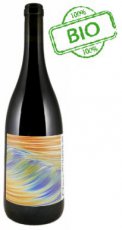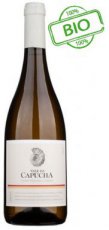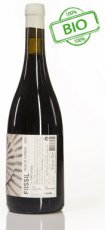Fossil Branco is a white blend, comprising of mostly Fernão Pires (otherwise known as Maria Gomes), with a bit of Arinto and a small percentage of other regional white grapes. It's not as striking as the 100% Arinto from the old vines close to Pedro's home, but its also not as intensely saline, making for a more "crowd-pleasing," crisp white, with subtle texture and a bit of weight
Pedro Marques is the fifth-generation in a winemaking family, based in Torres Vedras, just north of Lisbon. He has always been captivated by the subtlety and restrained minerality of the wines of central France, and the idea of ensuring the personality of a vineyard is expressed in the glass. His 13 hectares of vineyards, situated 9 km from the coast, have soils of Kimmeridgian clay with high proportion of ocean fossils, similar to those found in Chablis. The vineyards are bathed by fresh Atlantic breezes, further enhancing the saline element in the wines and tempering the warmth of the region. He has been certified organic since 2015, no easy task in this humid climate. His main plantings are white grapes – predominantly Portuguese locals Arinto and Fernão Pires plus a little Alvarinho, Gouveio, Viosinho and Antão Vaz. He also has a co-planting of Touriga Nacional and Tinta Roriz; a site with 80+ year old Castelão; and a small parcel of Syrah. In his own word he follows a “lazy” approach to winemaking, his only addition being a touch of SO2. His wines show great character, if you like textural, terroir-driven wines, this young winemaker is one to watch.
Food pairing
Serve with seafood, salads
Grapes: Arinto, Gouveio & Fernão Pires
Alcohol content
14 %vol
Storing & Saving
Store in a cool place (around 12ºC). Best drunk between 15 and 30 minutes after opening
Critics & Awards
Vale da Capucha is located near Quinta de S. José in Carvalhal, 10 km from the Atlantic coast, in the name of Lisboa. The company today is led by Pedro Marques, who in 2009 transformed his passion into a life project. His family has always produced wine but has focused more on quantity than on quality. With the arrival of Pedro, things change; Replaces the old vineyards with white grape varieties from other areas of Portugal, such as viosinho and Gouveio from Douro, Antão Vaz from Alentejo, Alvarinho of Vinho Verde and even the viognier of France. Converts biodynamic grain cultivation without using chemical treatments, and spontaneous fermentation fermentations, indigenous yeasts and at least 12 months of refining in the steel on fine lees for all its wines



 Ordering per bottle possible
Ordering per bottle possible Sharp prices
Sharp prices Secure payment
Secure payment Low shipping cost
Low shipping cost  Free shipping in Belgium on orders over €250 or radius of 10 km around Tremelo
Free shipping in Belgium on orders over €250 or radius of 10 km around Tremelo